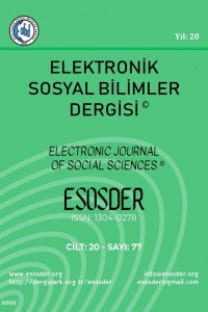GEÇMİŞİ KABUL ETME VE DEPRESYON
Geçmişi kabul etme, olumlu ve olumsuz geçmiş temsili, depresyon
ACCEPTING THE PAST AND DEPRESSION
-,
___
- Abramson, L. Y., Metalsky, G. I. ve Alloy, L. B. (1989). Hopelessness depression: A theory- based subtype of depression. Psychological Review, 96, 358-372.
- Bibring, E. (1953). The mechanism of depression. P. Greenacre içinde (Ed.), Affective disorders. New York: International University Press.
- Boyacıoğlu, İ. (2008). Geçmişi Anlamlandırma Ölçeği: Geçerlik ve güvenirlik çalışması. 15. Ulusal Psikoloji Kongresi (2-5 Eylül 2008, İstanbul), Tam Metin Kitabı, s. 161, İstanbul.
- Boyacıoğlu, İ. ve Sümer, N. (2011). Bağlanma boyutları, otobiyografik bellek ve geçmişi kabul etme. Türk Psikoloji Dergisi, 26, 105-118.
- Burroughs, H., Lovell, K., Morley, M., Baldwin, R., Burns, A. ve Chew-Graham, C. (2006). Justifiable depression: How primary care professionals and patients view late-life depression? A qualitative study. Family Practice, 23:369–77.
- Butler, R. N. (1963). The life-review: An interpretation of reminiscence in aged. Psychiatry, 26, 65-76.
- Chew-Graham, C. A., Mullin, S., May, C. R., Hedley, S. ve Cole, H. (2002). Managing depression in primary care: another example of the inverse care law? Family Practice, 19, 632-37.
- Courtois, C. A. (2004). Complex trauma, complex reactions: Assessment and treatment. Psychotherapy: Theory, Research, Practice, Training, 41(4), 412-425.
- Davidhizar, R. E. ve Lonser, G. (2002). When the health care manager is preoccupied with self-doubt. Health Care Manager, 21(2), 29-35.
- Erikson, E. H. (1963). Childhood and society. New York: Norton.
- Fenichel, O. (1945). The psychoanalytic theory of neurosis. New York: Norton.
- Garro, L. C. (2001). The remembered past in a culturally meaningful life: Remembering as cultural, social and cognitive process. H. Matthews and C. Moore içinde (Eds), The psychology of cultural experience. Cambridge: Cambridge University Press.
- Gençöz, F. (2000). Pozitif ve Negatif Duygu Ölçeği: Geçerlik ve güvenirlik çalışması. Türk Psikoloji Dergisi, 15, 19-26
- Haight, B. K. ve Haight, B. S. (2007). The handbook of structured life review. Baltimore, MD, US: Health Professions Press.
- Hope, D. (1987). The healing paradox of forgiveness. Psychotherapy, 24(2), 240-244.
- Howard, T. ve Glenn, A. (2009). Assessing positive life change: In search of meticulous methods. C.L Park, S.C. Lechner, M.H. Antoni, A.L. Stanton içinde (Eds), Medical illness and positive life change: Can crisis lead to personal transformation?. Washington, DC, US: American Psychological Association.
- Lecci, L., Okun, M. A. ve Karoly, P. (1994). Life regrets and current goals as predictors of psychological adjustment. Journal of Personality and Social Psychology, 66(4), 731- 741.
- Murray, J., Banerjee, S., Byng, R., Tylee, A., Bhugra, D. ve Macdonald, A. (2006). Primary care professionals' perceptions of depression in older people: a qualitative study. Social Science & Medicine, 63(5), 1363–73.
- Oatley, K. ve Bolton, W. (1985). A social-cognitive theory of depression in reaction to life events. Psychological Review, 92, 372-388.
- Oladinni, O. (2002). A survey of inner London general practitioners' attitudes towards depression. Primary Care Psychiatry, 8(3), 95–98.
- Rogers, A., May, C. ve Oliver, D. (2001). Experiencing depression, experiencing the depressed: The separate worlds of patients and doctors. Journal of Mental Health , 10(3), 317-33.
- Rosenberg, M. (1965). Society and the Adolescent Self-Image. Princeton, Princeton University Press.
- Santor, D. A. ve Zuroff, D. C. (1994). Depressive symptoms: Effects of negative affectivity and failing to accept the past. Journal of Personality Assessment, 63(2), 294-312.
- Savaşır I, Şahin NH (1997). Bilişsel Davranışçı Terapilerde Değerlendirme: Sık Kullanılan Ölçekler. Ankara, Türk Psikologlar Derneği Yayınları.
- Tedeschi, R. G. ve Calhoun, L. G. (2004). Posttraumatic growth: Conceptual foundations and empirical evidence. Psychological Inquiry, 15(1), 1-18.
- Watson, D., Clark, L. A., ve Tellegen, A. (1988). Development and validation of brief measures of positive and negative affect: The PANAS Scales. Journal of Personality and Social Psychology, 47,1063-1070.
- Wong, Y. J. (2006). Strength-centered therapy: A social constructionist, virtues-based psychotherapy. Psychotherapy: Theory, Research, Practice, Training, 43(2), 133-146.
- Wong, P. T. P. ve Fry, P. S. (1998). Introduction. P. T. P. Wong ve P. S. Fry içinde (Eds), The human quest for meaning: A handbook of psychological research and clinical applications.Mahwah, NJ, US: Lawrence Erlbaum Associates Publishers.
- ISSN: 1304-0278
- Yayın Aralığı: Yılda 4 Sayı
- Başlangıç: 2002
- Yayıncı: Cahit AYDEMİR
VISUALIZATION OF A SOCIAL PROBLEM: SPATIO-TEMPORAL ANALYSIS OF SEXUAL ASSAULTS IN TURKEY
Arif KEÇELİ, Naci DİLEKLİ, Necati ANAZ
BELEDİYE GELİRLERİ VE YENİ BİR GELİR KAYNAĞI OLARAK ŞEHİRLEŞME RANTI
ŞEHİRLEŞME RANTI, İrfan TÜRKOĞLU
İLKÖĞRETİM OKULLARINDA GÖREV YAPAN ÖĞRETMENLERİN OKULDAKİ ŞİDDET ÜZERİNE GÖRÜŞLERİ
INVESTIGATING INFIDELITY TENDENCY AND CONFLICT MANAGEMENT BASED ON ATTACHMENT STYLES AND GENDER
Didar Kantarcı BOĞDA, Gül ŞENDİL
ÖĞRETMEN ADAYLARININ AKICI OKUMANIN ÖĞRETİMİ VE DEĞERLENDİRİLMESİ İLE İLGİLİ ALGILARI
Mustafa ULUSOY, Hakan DEDEOĞLU, İhsan Seyit ERTEM
OTEL İŞLETMELERİNDE ÇALIŞANLARIN PARAYA OLAN TUTUMUNUN MESLEKİ ETİK DEĞERLER AÇISINDAN İNCELENMESİ
OKULA İLİŞKİN TUTUM ÖLÇEĞİNİN GEÇERLİK VE GÜVENİRLİK ÇALIŞMASI
GEÇMİŞİ KABUL ETME VE DEPRESYON
